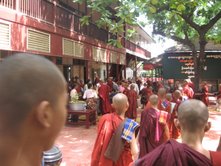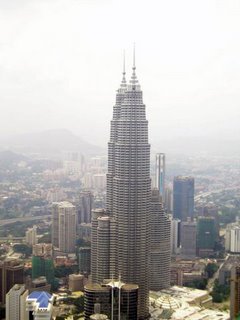"Wahyu, you must be crazy!" I was in the lobby of the
Rose Garden Hotel--a resort on Thailand's Nakorn Pathom, 32 km west of downtown Bangkok--with
Wahyuana, the fellow from Indonesia on his way to Burma at the start of the Southeast Asian Press Alliance (
SEAPA) journalism fellowship this year.
"Vhy?" He asked in that Indonesian accent I found amusing.
"Why are you going to Burma?"
He turned to me, puzzled.
"Vhy should I not go to Burma?"
"Because look at them---" I glanced at Myo Zaw and Than Win Htut, the two Burmese on exile here in Thailand, coming out of the hotel elevator on their way to the lobby. "People are going out of Burma, see? Myo Zaw and Win Htut are here, see? They're just too happy to get out of Burma but you, Wahyu, you're going to Burma---Why do you want to go to Buhma? You must be crazy, Vahyu!"
On the eve of our departure to the second country (and for Wahyu, that was to be Burma), tension and uncertainty was up in the air. Even the loud Thai pop song that was playing in the restaurant where we ate spicy Thai food did not help dissipate the tension.
"If you're in Buhma, you can't mention my name!" Win Htut warned Wahyu during our pre-departure briefing. "You mention my name??! You go to prison!" He punctuated his statement with very strong gestures and wild pursing of his mouth. Then, after a while, he said, "But you can mention Myo Zaw. Myo Zaw is a friendly name, he's safe. He's popular among the academics. But me? Everybody is looking for me in Buhma!"
In Buhma, talk only to certain people who will be referred to you by trusted people. These trusted people should also be referred to you by another set of trusted people, Myo Zaw said.
"You should always be careful when you move around! They don't want journalists in Buhma! "
On the internet at the hotel lobby, I chanced upon the computer which Wahyu had been using before I came in. On the screen were images of pain---bandaged arms, blown up bodies, stitched scalps, bloody heads. Those were images of Burma.
"What is in Burma that really fascinates you, Wahyu? Makes you want to go there?"
"I vant to go there because I vant to understand."
"Understand what? You want to understand Burma??"
"No, not Buhma. I vant to unduhstand Moluccas. In Moluccas, people get slaughtered. My friend died in Moluccas. Sometimes, I interview people in Moluccas and then the next thing that I know, they're dead already. I saw the bodies in Moluccas. They used to make me--(he gestures throwing up)! Now, I want to go to Burma to understand these things. Because I don't understand."
I could never write the exact way that Wahyu talk. But this was how, our short talk went before he left for Buhma. In Buhma, he talked to the monks. He went there as a tourist, like
Paul Theroux, I joked. "Never talk of politics," he kept saying over and over again, like a mantra. Instead, talk about the price of watches, I said.
He went to Buhma to understand Moluccas. I went to Malaysia and crossed a river in Sarawak because I did not understand anything. Yesterday, Wahyu arrived in Bangkok, at last, to see the rest of the fellows arriving from the second country of our choices. "So, howz Buhma, Wahyu???" everybody was asking.
"No good food in Buhma!" was his conclusion as SEAPA made us sit down to dinner at Bangkok's
Royal River Hotel, where we're staying to write our stories.

